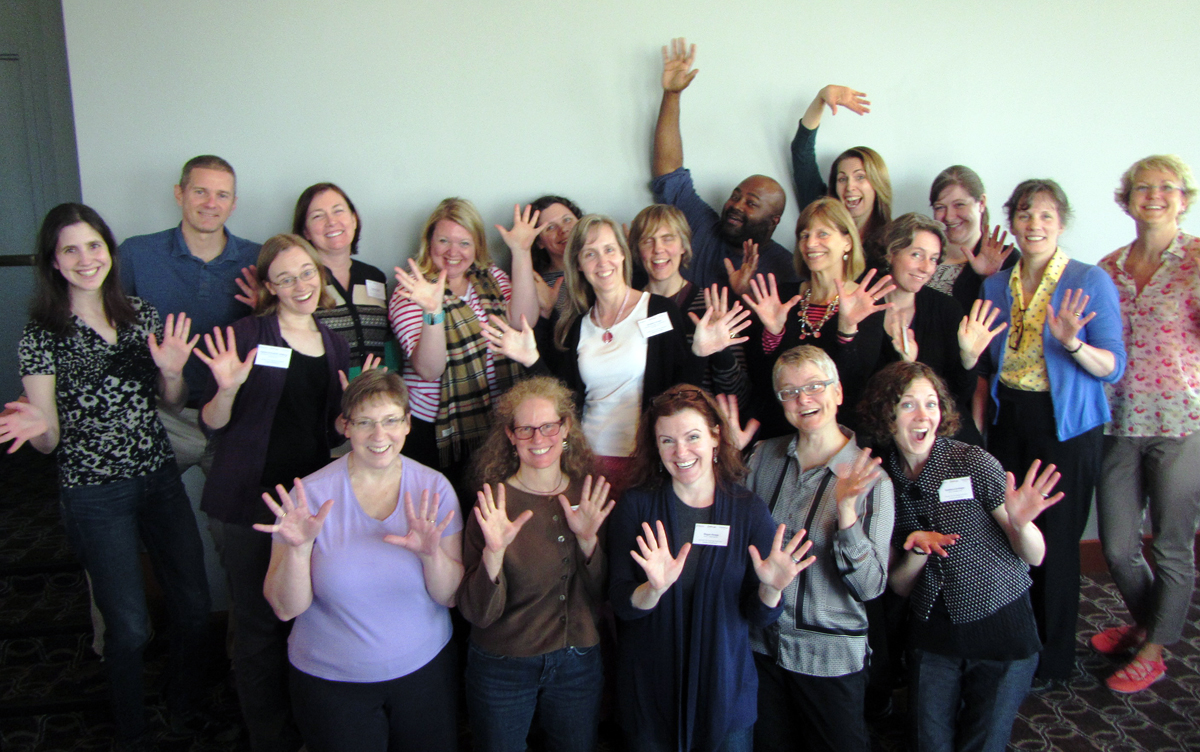Library CE Training Institute Curriculum

With funding from the Institute of Museum and Library Services (IMLS) and in partnership with Infopeople, WebJunction offered a free, 4-month training program for seasoned trainers in public libraries who wanted to learn best practices for designing and delivering online learning, in particular looking for approaches to self-paced e-learning that take less time than is customary and make use of existing resources. The cohort explored emerging best practices for effective learning, with a focus on teamwork, sharing, and mutual support.
This training was delivered as a blend of live online workshops, self-paced tutorials, and an in-person session. This is an overview of the curriculum and resources shared with the participants.
Week One: Gearing up for online learning development
Online Kickoff session: April 8 (Session slides)
- Overview of program goals and vision (See CE Institute Outline and Learning Objectives)
- E-learning rocks!
- Discover the distinct advantages of online learning, beyond time/cost savings (See E-Learning Modes handout)
- Library learning for the 21st century
- Learn about recent “21st century” updates to the Competency Index for the Library Field
Week Two: Designing and collaborating for online learning
Online Session #2: April 16 (Session slides)
- Engaging the learner online:
- Discover webinar best practices and strategies for engagement in the live online environment (resource: Guide to Successful Webinars)
- Learn some engagement strategies for the self-paced experience
- Collaboration for library CE
- Explore the potential for collaboration to maximize impacts of learning opportunities within the current CE landscape
- Priority topics for the library field
- Identify specific topics for developing content that builds 21st century library competencies
- Negotiate working group alliances to prepare for collaborative development of learning objects
Week 3—4: Building content development skills (April 21 – May 4)
The project provided an online learning environment to support all asynchronous course activities, collect course resources, and foster discussion and sharing among participants and facilitators.
- Each working group confirms their topic selection
- Individual cohort members obtain Storyline licenses from WebJunction; download & install
- Participants take basic Storyline training.
Week Five: Two-day in-person immersion (May 6 – 7)
(Session slides and Participant Agenda)
Day One
- Instructional design for online
- Apply instructional design principles to support and empower e-learners
- Learn basic graphic design principles for an effective look-and-feel
- Focus on assessments and outcomes
- Activity: groups work together to sketch out learning objectives for selected topics and designs for content objects; critiques and feedback
- See also Instructional Design resources
- Defining quality
- Identify characteristics of quality and design strategies for achieving it (see Continuum of Quality)
- Rapid course development models
- WebJunction and Infopeople share pilot models for rapid online course development (See QUICK Development Model)
- Explore other models for rapid, cost-effective development of eLearning content
- WebJunction and Infopeople share pilot models for rapid online course development (See QUICK Development Model)
- Hands-on with authoring tools
- Discuss how to fit the tool to the learning objectives (not the other way around)
- Activity: working groups begin to build framework for learning objects, applying existing knowledge and co-learning new skills
- See Project Plan for Course Creation and Course Development Workbook
Day Two
- Hands-on with authoring tools
- Open lab for working groups: continue to develop self-paced learning objects (including evaluation/assessment component); increase skills with tools
- Reconvene with all to share discoveries
- Virtual collaboration
- Devise strategies for continuing to work effectively in the virtual environment
- Working groups map out plan for completing the project through virtual collaboration; share plan with all
Week 6—9: Creating learning objects (May 12 – June 8)
Working groups meet and work to advance their projects, using the Moodle learning environment and other online collaboration tools of choice. Groups post their work plans and schedules, updating them as work progresses. WebJunction and Infopeople facilitators provide support and guidance throughout.
Online Session #3: May 29 (Session slides)
- Meet to discuss what’s working and what challenges have surfaced
- Synchronous opportunity to strategize and support each others’ efforts
Week 10—14: Creating learning objects (June 9 – July 3)
Working groups work toward prototyping their learning objects to the point where they can test them online; participants view each others’ e-learning objects for inspiration and feedback.
Online Session #4: June 20 (Session slides)
- Show & Tell: each group demo a 10-minute segment of their works-in-progress
- Continuing collaboration: how to connect with others to increase coordination among CE providers
- Devise plans to teach rapid development models to others
Week 15—19: Offering new learning content to the library field (July 7 – August 15)
Working groups complete their learning objects by August 15. Courses will be uploaded to WebJunction (and other locations chosen by participants) and offered as learning for the library field by the end of September. Evaluation of the program will continue through the end of September.
Online Session # 5: August 28 (Session slides)
- Sharing Your Project
- Biggest Wins! Biggest Challenges!
- Moving Forward & Staying Connected
- Sharing With the Field

